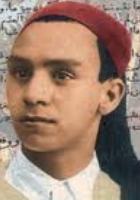Aboul-Qacem Echebbi
Aboul-Qacem Echebbi Poems
Hey you, the unfair tyrants...
You the lovers of the darkness...
You the enemies of life...
You've made fun of innocent people's wounds; and your palm covered with their blood
...
O defenders of the Homeland!
Rally around to the glory of our time!
The blood surges in our veins,
We die for the sake of our land.
...
When people choose a noble and worthy existence
The Fates will accordingly respond
Gloom of night will lift and vanish
Fetters will break open
...
In the silence of the night when
The universe adheres to godliness
Wishes disappear behind serenity
The thunder muttered a chant
...
Morn breaks forth singing to the delicate life always.
While the hills still dream in the shadow of thick boughs all days.
The flakey north wind shakes the dried flowers leaves.
Yet the light swings inside the dark valleys spreading its rays.
...
O dear child, whose life was a charming melody,
A pure white rose, wafting its fragrance at colorful sunsets!
...
I wish I can live this life in my solitude and isolation
spending my days in the mountains and the woods
between the pine trees, not having worldly cares that
can shift the self from listening to the soul
...
Aboul-Qacem Echebbi Biography
Aboul-Qacem Echebbi (Arabic: أبو القاسم الشابي Abū al-Qāsim ash-Shābbī) (24 February 1909 - 9 October 1934) was a Tunisian poet. He is probably best known for writing the final two verses of the current National Anthem of Tunisia, Humat al-Hima (Defenders of the Homeland), that was written originally by the Egyptian poet Mustafa Sadik el-Rafii. Echebbi was born in Tozeur, Tunisia, on 24 February 1909, the son of a judge. He obtained his attatoui diploma (the equivalent of the baccalauréat) in 1928. In 1930, he obtained a law diploma from the University of Ez-Zitouna. The same year, he married and subsequently had two sons, Mohamed Sadok, who became a colonel in the Tunisian army, and Jelal, who later became an engineer. He was very interested in modern literature in particular, and translated romantic literature, as well as old Arab literature. His poetic talent manifested itself at an early age and this poetry covered numerous topics, from the description of nature to patriotism. His poems appeared in the most prestigious Tunisian and Middle-Eastern reviews. His poem To the tyrants of the world became a popular slogan chant during the 2011 Tunisian and subsequently Egyptian demonstrations.[1] Echebbi died on 9 October 1934 at the Habib-Thameur Hospital in Tunis, Tunisia following a long history of cardiac disorders. His portrait is on the current 30 DT note.)
The Best Poem Of Aboul-Qacem Echebbi
To The Tyrants Of The World
Hey you, the unfair tyrants...
You the lovers of the darkness...
You the enemies of life...
You've made fun of innocent people's wounds; and your palm covered with their blood
You kept walking while you were deforming the charm of existence and growing seeds of sadness in their land
Wait, don't let the spring, the clearness of the sky and the shine of the morning light fool you...
Because the darkness, the thunder rumble and the blowing of the wind are coming toward you from the horizon
Beware because there is a fire underneath the ash
Who grows thorns will reap wounds
You've taken off heads of people and the flowers of hope; and watered the cure of the sand with blood and tears until it was drunk
The blood's river will sweep you away and you will be burned by the fiery storm.
